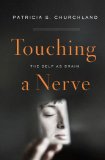October 23, 2013

The Two Selves: Their Metaphysical Commitments and Functional Independence by Stanley B. Klein (Oxford University Press, USA, 2013)
(amazon.co.uk)
Book description from the publisher:
The Two Selves takes the position that the self is not a “thing” easily reduced to an object of scientific analysis. Rather, the self consists in a multiplicity of aspects, some of which have a neuro-cognitive basis (and thus are amenable to scientific inquiry) while other aspects are best construed as first-person subjectivity, lacking material instantiation. As a consequence of its potential immateriality, the subjective aspect of self cannot be taken as an object and therefore is not easily amenable to treatment by current scientific methods.
Klein argues that to fully appreciate the self, its two aspects must be acknowledged, since it is only in virtue of their interaction that the self of everyday experience becomes a phenomenological reality. However, given their different metaphysical commitments (i.e., material and immaterial aspects of reality), a number of issues must be addressed. These include, but are not limited to, the possibility of interaction between metaphysically distinct aspects of reality, questions of causal closure under the physical, and the principle of energy conservation.
After addressing these concerns, Klein presents evidence based on self-reports from case studies of individuals who suffer from a chronic or temporary loss of their sense of personal ownership of their mental states. Drawing on this evidence, he argues that personal ownership may be the factor that closes the metaphysical gap between the material and immaterial selves, linking these two disparate aspects of reality, thereby enabling us to experience a unified sense of self despite its underlying multiplicity.
Google Books preview:
Comments (0)
- new books,self
October 9, 2013

Identity And Difference: John Locke And The Invention Of Consciousness by Etienne Balibar (Verso, 2013)
(kindle ed.), (amazon.co.uk)
Book description from the publisher:
John Locke’s foundational place in the history of British empiricism and liberal political thought is well established. So, in what sense can Locke be considered a modern European philosopher? Identity and Difference argues for reassessing this canonical figure. Closely examining the “treatise on identity” added to the second edition of An Essay Concerning Human Understanding, Étienne Balibar demonstrates Locke’s role in the formation of two concepts central to the metaphysics of the subject—consciousness and the self—and the complex philosophical, legal, moral and political nature of his terms.
With an accompanying essay by Stella Sandford, situating Balibar’s reading of Locke in the history of the reception of the Essay and within Balibar’s other writings on “the subject,” Identity and Difference rethinks a crucial moment in the history of Western philosophy.
Comments (0)
- consciousness,new books,self
June 28, 2013

Touching a Nerve: The Self as Brain by Patricia S. Churchland (W.W. Norton & Co., 2013)
(kindle ed.), (amazon.co.uk)
Book description from the publisher:
A trailblazing philosopher’s exploration of the latest brain science—and its ethical and practical implications.
What happens when we accept that everything we feel and think stems not from an immaterial spirit but from electrical and chemical activity in our brains? In this thought-provoking narrative—drawn from professional expertise as well as personal life experiences—trailblazing neurophilosopher Patricia S. Churchland grounds the philosophy of mind in the essential ingredients of biology. She reflects with humor on how she came to harmonize science and philosophy, the mind and the brain, abstract ideals and daily life. Offering lucid explanations of the neural workings that underlie identity, she reveals how the latest research into consciousness, memory, and free will can help us reexamine enduring philosophical, ethical, and spiritual questions: What shapes our personalities? How do we account for near-death experiences? How do we make decisions? And why do we feel empathy for others? Recent scientific discoveries also provide insights into a fascinating range of real-world dilemmas—for example, whether an adolescent can be held responsible for his actions and whether a patient in a coma can be considered a self.
Churchland appreciates that the brain-based understanding of the mind can unnerve even our greatest thinkers. At a conference she attended, a prominent philosopher cried out, “I hate the brain; I hate the brain!” But as Churchland shows, he need not feel this way. Accepting that our brains are the basis of who we are liberates us from the shackles of superstition. It allows us to take ourselves seriously as a product of evolved mechanisms, past experiences, and social influences. And it gives us hope that we can fix some grievous conditions, and when we cannot, we can at least understand them with compassion.
Google Books preview:
Comments (0)
- cognitive science,consciousness,new books,self





